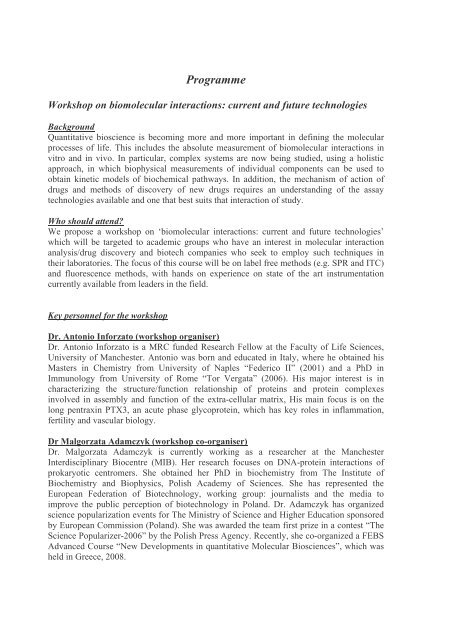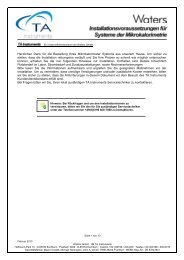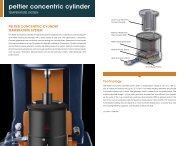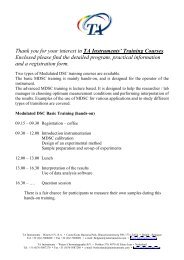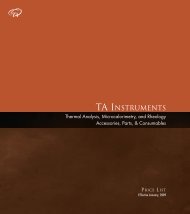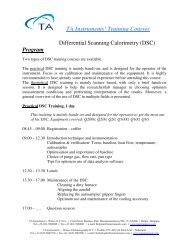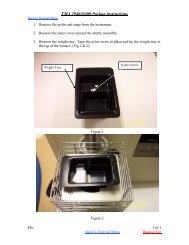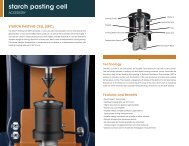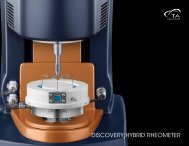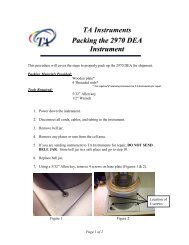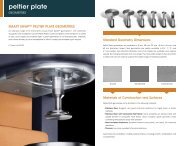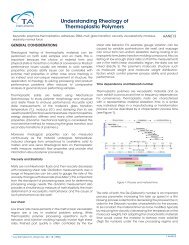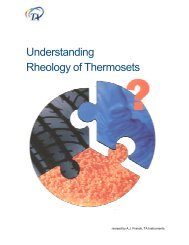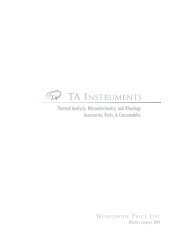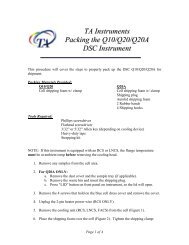Programme - TA Instruments
Programme - TA Instruments
Programme - TA Instruments
- No tags were found...
Create successful ePaper yourself
Turn your PDF publications into a flip-book with our unique Google optimized e-Paper software.
Dr. Thomas Jowitt (workshop co-organiser)Dr. Jowitt is a senior experimental officer at the Biomolecular Analysis Core Facility at theLife Sciences facility at Manchester University. This facility contains 16 complimentaryanalysis systems (biophysical and mass spectrometric) supported by high resolutionelectrophoretic and chromatographic micro separation systems. The facility has been set upto promote and facilitate the use of biomolecular analysis techniques in the Faculty. Thereare a number of different modes of interaction with the facility including tailored projectadvice, full service provision, project-work involving facility staff and supportedinstrument access. Instrumentation includes analytical ultracentrifugation, calorimetry,circular dichroism, fluorescence spectroscopy, multi-angle light scattering and surfaceplasmon resonance.Dr. Farid Khan (main organiser)Dr. Khan is a senior researcher in biomolecular interactions at the Manchester Centre forSystems Biology. His role includes measurement of enzyme kinetics and bindingparameters in biochemical pathways in order to model pathways in organisms. He is anexperienced bio-technologist with a PhD in protein engineering from CambridgeUniversity, with expertise in biophysical techniques including drug discovery, biochiparrays, fluorescence detection systems, cell free synthesis, molecular interactions, assaydevelopment (GSK), molecular biology, protein stability, folding kinetics, protein structure(NMR, fluorescence and CD) and protein purification. Dr. Khan is also a lecturer in aMasters course in Biotechnology and Enterprise at the University of Manchester. He hasgiven seminars on his work and teaches advanced protein techniques to graduates and staff.Dr. Khan is a partner in a European project dedicated to new molecular tools to analyseprotein interactions of the human proteome.Mr. Pirthipal Singh (workshop speaker)Mr. Pirthipal Singh has over 30 years experience at AstraZeneca in assays development fordrug discovery and HTS. Recently, he has formed his own consultancy in which heprovides a service for support and training for academics and the pharma-biotech industry.His expertise lies in new technology evaluation and project support. In particular, helectures on biochemical assay development (binding and enzymatic) and he has experienceof numerous projects (pre- and post-HTS) covering many target classes, including the useof radioactive and non-radioactive signal outputs, as well as direct and indirect detection(immunoassays) assay methods. He has also implemented automation for compounddissolution and assay assembly to help streamline assay protocols with development andscreening in assay panels for compound profiling. He has introduced several commerciallyavailable homogeneous ('mix-and-measure') assay methods (alongside assayminiaturization and automation) to increase HTS capacity, efficiency and data quality. Mr.Singh has also provided training and support provided to AstraZeneca staff, with respect toemerging technology evaluations and assay developments for both project needs and HTS.Dr. Sanjay Nilapwar (speaker)Dr. Nilapwar is currently working as an experimental officer managing BiomolecularInteractions facility at the Manchester Interdisciplinary Biocenter (MIB, ManchesterUniversity). His role includes teaching, experimental work, method development and dailymanagement of the Biomolecular Interactions Facility. He is an experienced molecularbiophysicist with a PhD from University College London, with expertise in biophysicaltechniques including ITC, CD, SPR, light scattering and capillary electrophoresis. He has
more than six years of hands on experience on measurement and interpretation ofthermodynamic data in biological systems.Dr. Tariq Ali (co-organiser)Tariq Ali is a research associate in the faculty of Life sciences, University of Manchesterworking on the functional characterisation of molecules associated with the extracellularmatrix. He currently specialises on protein expression and bio-molecular interactions usinga range of cell and molecular biology and biophysical techniques. He obtained his PhDfrom the University of Cambridge working on DNA-protein interactions and then moved tothe University of Oxford where he was involved with the functional and structuralcharacterisation of specific members of the TGF-beta super-family of proteins.Workshop on biomolecular interactions: current andfuture technologiesDates 1-4 th June, 2009VenueThe University of Manchester Incubator CompanyUMICGrafton StreetManchester M13 9XXwww.umic.co.ukConfirmed Sponsors:Farfield
1. Label-free molecular interaction analysisDay 1Workshop 1: BIAcore technology-Surface Plasmon Resonance (SPR)(Dr. Tim Fagge, GE Healthcare)Morning(i) Basic kinetics course• Introduction to Biacore’s technology.• Basic theory of kinetic and affinity analysis• Software evaluation of data from 1:1 binding experiments• Recognition of deviations from 1:1 binding model• Optimization of important experimental parametersAfternoon(ii) Advanced Kinetics course• Advanced evaluation features• Custom evaluation models• Interpreting the fit• Case studies & Hands on practical using the Biacore T100Day 2Workshop 2: Emerging technologiesMorning(i) Analight technology (Farfield)(ii) Attana 100 (Attana sensor technologies)(iii) Acoustic sensing with the RAPid4 (TTP Labtech)(ii) Reichert SPR technology and the Q-Sense E4 (S&M Products Ltd)(iii) BIND Reader biomolecular interactions in microplates (SRU Biosystems)(iv) Corning Epic System HTS screening system (Corning)(v) SensiQ Pioneer (Labtech International)(vi) The Octet Red measuring protein interactions and small molecules (FortéBio)(vii) ProteOn XPR36 Protein Interaction Array System (BioRad)
AfternoonIsothermal Titration Calorimetry (ITC)(i) Introduction to Isothermal Titration Calorimetry (Dr.Geoff, Holdgate,AstraZeneca, UK)(ii) Investigating Thermodynamics of Molecular Interactions by ITC (MicroCal, UK)(iii)Application of Microcal ITC200 in determination of Enzyme kinetics parameters(Dr. Sanjay Nilapwar, MIB, UK)(iv) Enzyme kinetics, protein interactions and membrane interactions (Speaker TBA,<strong>TA</strong> <strong>Instruments</strong>, West Sussex)(v) Thermodynamics and drug assays (Dr. Malkhey Verma, MIB, UK)
2. Fluorescence assays in drug discoveryDay 3Workshop 3: Fluorescence based technologiesMorning(i) Overview of homogeneous fluorescence techniques used in HTS for drug discovery andassay development(Dr. Farid Khan, MCISB, U.K)• Basic principles underlying fluorescence assays.• Labels and labelling chemistries• Instrumentation, Interferences and limitations• Biochemical and cellular applications.Afternoon(ii) Enzyme and Binding Assays in Drug Discovery(Mr. Pirthipal Singh, Singh Consultancy, UK)• Basic principles underlying enzyme and binding assays.• Enzyme kinetics inhibition: competitive, noncompetitive, uncompetitive, irreversible etc.• Assay Development / Screening projects and HTS• Assay miniaturization and automation• Case studies: focus on kinases, and proteases.• HTRF Kinase assays (Beckman-DTX and BMG-Labtech’s PHERAstar & CisBioreagents)3. Exhibitors Fair & TalksDay 4MorningAttana sensor TechnologiesThe Attana series of BiosensorsBeckman CoulterDTX multimode plate readers and the Optima series for label free detectionBerthold TechnologiesMithras and TriStar multimode readers.
BioRadProteOn XPR36 Protein Interaction Array SystemBMG’s LabtechPOLARstar Omega,PHERAstar PlusOmega Series, RUBYstarCaliper Life SciencesThe LabChip EZ Reader.Cis-BioTR-FRET assaysCorningCorning Epic System HTS screening systemFarfieldThe Analight systemAfternoonFortéBioThe Octet Red systemGE HealthcareBiacore SPR systems:Biacore X100, Biacore T100, Biacore A100 and Biacore Flexchip systems.Labtech InternationalSensiQ Pioneer, Modulus II Multi-detection Microplate Reader and NanoDrop series ofinstruments.MicroCalThe ITC200 and fully automated ITC systemScientific & Medical Products LtdReichert SPR and Q-Sense and QCM-D techniques.SRU BiosystemsThe BIND SPR system<strong>TA</strong> <strong>Instruments</strong>The Nano ITC, Nano DSC and <strong>TA</strong>M microcalorimeter systemsTTP LabTechRAPid 4 i and Acumen e X3 instruments.


